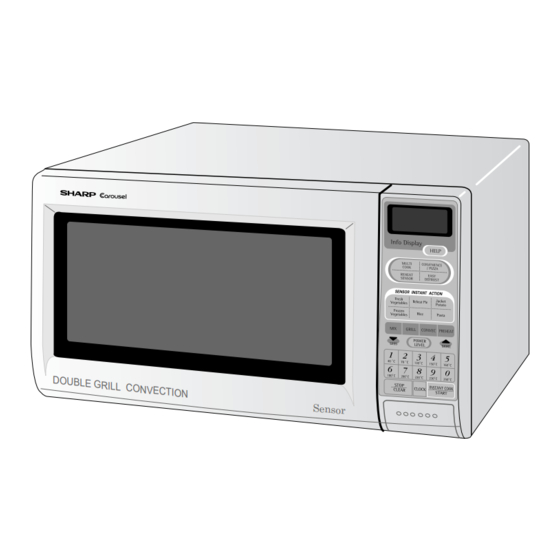Sharp Carousel R-880F Manuel d'entretien - Page 22
Parcourez en ligne ou téléchargez le pdf Manuel d'entretien pour {nom_de_la_catégorie} Sharp Carousel R-880F. Sharp Carousel R-880F 48 pages. Double grill convection microwave oven
Également pour Sharp Carousel R-880F : Manuel d'entretien (3 pages)

R-880F(S)
The touch control section consists of the following units as
shown in the touch control panel circuit.
(1) Key Unit
(2) Control Unit (The Control unit consists of Power unit
and CPU unit.)
The principal functions of these units and signals commu-
nicated among them are explained below.
Key Unit
The key unit is composed of a matrix, signals generated in
the LSI are sent to the key unit from P40, P41, P72, P73
P74, P75, P76 and P77.
When a key pad is touched, a signal is completed through
the key unit and passed back to the LSI through P44 - P47
to perform the function that was requested.
Control Unit
Control unit consists of LSI, power source circuit, synchro-
nizing signal circuit, reset circuit, buzzer circuit, relay
circuit, temperature measurement circuit, indicator circuit,
absolute humidity sensor circuit and back light circuit.
1) LSI
This LSI controls the temperature measurement sig-
nal, AH sensor signal, key strobe signal, relay driving
signal for oven function and indicator signal.
2) Power Source Circuit
This circuit generates voltage necessary in the control
unit.
Symbol
Voltage
VC
-5.2V
3) Synchronizing Signal Circuit
The power source synchronizing signal is available in
order to compose a basic standard time in the clock
circuit. It accompanies a very small error because it
works on commercial frequency.
LSI
The I/O signal of the LSI are detailed in the following table.
Pin No.
Signal
1
C1
2
VL1
3-5
AN7-AN5
6
AN4
7
AN3
TOUCH CONTROL PANEL ASSEMBLY
OUTLINE OF TOUCH CONTROL PANEL
Application
LSI(IC1)
DESCRIPTION OF LSI
I/O
IN
Terminal not used.
IN
Power source voltage input terminal.
Standard voltage for LCD.
IN
Heating constant compensation terminal.
IN
Terminal not used.
IN
Temperature measurement input: OVEN THERMISTOR.
By inputting DC voltage corresponding to the temperature detected by the
thermistor, this input is converted into temperature by the A/D converter built
into the LSI.
4) Reset Circuit
A circuit to generate a signal which resets the LSI to the
initial state when power is supplied.
5) Buzzer Circuit
The buzzer is responsive to signals from the LSI to emit
audible sounds (key touch sound and completion
sound).
6) 2nd. Interlock Relay Control Switch
A switch to "tell" the LSI if the door is open or closed.
7) Relay Circuit
To drive the magnetron, grill heaters, bottom heater,
convection motor, fan motor, turntable motor, convec-
tion motor and light the oven lamp.
8) Back Light Circuit
A circuit to drive the back light (Light emitting diodes
LD1 - LD10).
9) Indicator Circuit
This circuit consists of 2 line, 7-digits, 45-segments
and 5-common electrodes using a Liquid Crystal Dis-
play.
10) Temperature Measurement Circuit : (OVEN THER-
MISTOR)
The temperature in the oven cavity is sensed by the
thermistor. The variation of resistance according to
sensed temperature is detected by the temperature
measurement circuit and the result applied to LSI. The
LSI uses this information to control the relay and
display units.
11) Absolute Humidity Sensor Circuit
This circuit detects the humidity of a food which is
being cooked, to control its automatic cooking.
Description
20
